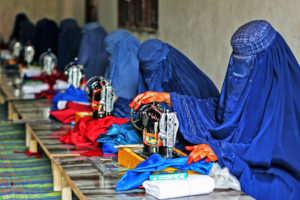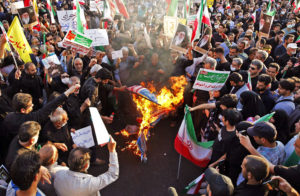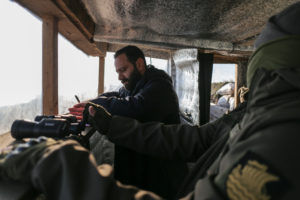The Islamic Revolutionary Guard Corps (IRGC) is an idiosyncratic creation of Iran’s revolutionary class that now sits at the centre of the modern Iranian state. In 1979, the Islamic constitution established the group as an “ideological army” — in deliberate contrast to the country’s regular armed forces, the Artesh. Its purpose was and is clear: to wage “an ideological mission of jihad in God’s way; that is, extending the sovereignty of God’s law throughout the world”.
Britain is now one of its many targets. The IRGC has sponsored terror, kidnap and seemingly endless sordid criminal acts since its founding. Its targets have always been global and since 2015, there has been a surge in IRGC activity in the UK and Europe. In 2022, MI5 acknowledged a real threat from Iran’s “aggressive intelligence services” to kidnap or kill UK-based people.
On Monday, the UK placed further sanctions on Iranian officials following the execution of dual British-Iranian national Alireza Akbari. On 12 January 2023, the House of Commons passed a motion calling on the UK government to finally proscribe Iran’s Islamic Revolutionary Guard Corps (IRGC) as a terrorist organisation. The vote passed unanimously in favour, though it’s not binding. It does, however, remain an indication of the growing tensions between the UK and Iran, which have intensified after the recent execution of dual British-Iranian national, former Iranian Deputy Minister of Defence Alireza Akbari, for alleged spying.
On one level, as Kasra Aarabi, Iran Programme Lead at the Tony Blair Institute, observes, the IRGC is a “violent, Islamist-extremist organisation that operates no differently to proscribed groups in the United Kingdom, including the Islamic State (ISIS), al-Qaeda and Hizbullah”. But the group is more than this. Key figures in the 1979 revolution — some of whom had trained with the Palestine Liberation Organisation (PLO) in Lebanon and even, further back, the Muslim Brotherhood — decided that, after the Islamic Revolution achieved victory by overthrowing the Shah, Mohammad Reza Pahlavi, an organisation would be needed not just to safeguard the revolution, but to bolster and strengthen it.
A tough gig, then. But what makes the IRGC so potent, beyond mere military prowess, is its ideological mission — which has only grown over the past few decades. If the group’s centrality emerged with the foundation of the state, its only increased in 1989 when Ali Khamenei succeeded Ayatollah Ruhollah Khomeini as the Islamic Republic’s Supreme Leader. Khamenei was determined to use the IRGC to further spearhead one of post-revolutionary Tehran’s key ideological tenets: exporting its Islamic revolution across the Muslim world. For this task, he set up a division known as the Quds (Jerusalem) Force, whose official objective is to “liberate” Jerusalem through the destruction of the state of Israel.
The Quds Force has become the engine of Iranian offensive operations across the Middle East — murdering its way across Syria, Yemen and Iraq, to name just a few countries. And in all the theatres in which it operates it does so not just as a military outfit, but a political one, too.
The case of Iraq is instructive. It is Tehran, partly through skilfully deploying its Quds Force, that has been the clear winner of 2003’s cretinously planned and executed invasion of Iraq. From the beginning it exploited the void left by the overthrow of Saddam Hussein, to expand its political, military and economic penetration of Baghdad. This is the bonus that comes with “extending the sovereignty of God’s law throughout the world”. It tends to have considerable geopolitical benefits.
It’s no surprise that the Quds Force was led by Qasem Soleimani, who — until the US droned him in Baghdad in January 2020 — was a man of great charisma, striking looks and political acumen. Yes, Tehran was behind a lot of the violence in post-invasion Iraq, not least through its founding and sponsoring of several Shia militias to challenge and often supplant Baghdad’s authority. But it was the political talents of Soleimani, and his Iraqi sidekick Abu Mahdi Al-Muhandis (who was killed in the same drone strike), that really drove the Iranian stake into the heart of Iraqi governance.
When, in 2014, several of the Iran-based Shia militias decided to band together in an umbrella organisation that came to be known as Popular Mobilisation Forces (PMF), it was Soleimani and Muhandis who kept their near-pathological infighting in line, and who were integral to formulating their political strategy. They were soldiers, but they were also what the Russians would call “political technologists”.
When they got whacked, it all started to fall apart. In the October 2021 Iraqi general elections, the political block of the Iran-backed Shia militias lost badly; and it lost because the various parties failed to understand the ramifications of electoral reforms, while their opponents used them to their own advantage. Since then, Baghdad has been unable to form a government while the Shia militias are squabbling among themselves and becoming even more unpopular among the Iraq people.
As one regional expert told me last year: “The mess the Iran-backed Shia militias are in right now, can be traced directly to that drone strike in 2020. Without Soleimani they simply aren’t as politically effective.”
This speaks to an important, and inescapable, wider truth: All of the IRGC’s soft power activities are designed to aid its hard power activities. It has, over decades, cultivated demonstrably effective political, cultural, economic and intelligence divisions, the importance of which can never be underestimated. They ensure the group’s influence permeates into almost all aspects of national life, and across the Middle East — and now, critically, even in the United Kingdom.
In the UK, the IRGC can rely on a lattice of ostensibly religious and cultural institutions to further its ideological and criminal aims. Much of its propaganda, which is designed to nurture homegrown extremism, poses a threat to Britain’s national security and promotes the Guard’s ideology in mosques, charities and schools.
An analysis of the IRGC’s training manuals used to radicalise recruits reveals that the group’s ideology promotes both violence and a clear doctrine of extremism underpinned by a misreading of Islamic texts similar to terror groups like ISIS and al-Qaeda. The materials make armed jihad against “enemies of Islam” — identified as non-Muslims and opponents of the regime (including Muslims) — an imperative for adherents, and explicitly calls for killings against Jews, Christians and Zoroastrians.
As ever, ideology stands in the service of politics. The materials are at pains to stress that there is an equally strong imperative to torture Iranians who oppose the Islamic Republic prior to their execution on the basis they are “waging war against God” (moharebs).
As protests continue across Iran following the killing of Mahsa Amini in police custody on 16 September 2022, a succession crisis also looms. The 83-year-old Khamenei is seeking to ensure that his son Mojtaba, if he does not follow him as Supreme Leader, is at least the real power broker in Iran. In the background sit the IRGC, determined that whoever succeeds will be amenable to their interests.
Right now, Iran is in flux. The protests are unquestionably the most serious the regime has ever faced. The IRGC’s foot soldiers, the Basij, are out in the streets alongside the protestors doing what they do best — killing and maiming. Alongside mass unrest, the economy is tanking; summer will bring with it the now-familiar problem of drought. The threats facing Tehran are multiple and pretty much existential now.
The Mullahs and their sadistic enforcers are worried. In a state known for its near-pathological exercise of control, the future is unusually vague. One thing, though, is certain: whatever happens next, the IRGC will stand malevolently at the centre of it, and not just in Tehran but, unless the UK government finally acts, increasingly in London as well.
Disclaimer
Some of the posts we share are controversial and we do not necessarily agree with them in the whole extend. Sometimes we agree with the content or part of it but we do not agree with the narration or language. Nevertheless we find them somehow interesting, valuable and/or informative or we share them, because we strongly believe in freedom of speech, free press and journalism. We strongly encourage you to have a critical approach to all the content, do your own research and analysis to build your own opinion.
We would be glad to have your feedback.
Source: UnHerd Read the original article here: https://unherd.com/




